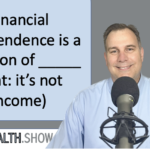Proverbs 21:20 says there is treasure to be desired and oil in the dwelling of the wise. But a foolish man spendeth it up.
Warren Buffett said, do not save what is left after spending, but spend what is left after savings. Today I want to discuss the one thing that is required to build wealth.
A lot of people think that wealth building is a function of income, meaning the more income I have, the more wealth I’ll be.
And while that might be the case, it doesn’t necessarily guarantee it. I know people that are making, in fact I’ve coached many people that are making 200 to 300, 000 a year, but they’re still struggling with money. They’re still struggling with their budgeting. They’re even in debt and using credit cards to augment their spending.
Years ago, back when I was at the CIA, I did a presentation on managing the money you have, and it opened with an icebreaker of various athletes who had played in essentially various sports and made millions of dollars over their working career. And yet all of them that I used in that illustration ended up either filing for bankruptcy or getting foreclosed on.
And they made millions of dollars, but they ended up broke. The reality is that you too are probably going to make millions of dollars over your working lifetime, but it’s not how much you make that will determine whether you build wealth. It’ll depend on how much you save.
Here’s the cold reality of the situation. To build wealth savings is required without savings. You will not build wealth. And we look at the financial framework. We can see that there’s savings involved in step one and step three and step four and step five and step seven. Essentially every step of the financial Building process requires savings.
Financial independence requires savings. I’m going to show you in our next episode, how that financial independence really is a function of savings rate. So, to help illustrate this a little bit, let’s jump into right capital and see a scenario about Joe and Jane average.
And so, transitioning in the right capital here, we see again, Joe and Jane average they are a couple with two children kind of simulating an average American, right? So, they have some savings, they have some debt, they have some property, and They kind of doing a little bit of retirement.
So just kind of normal, just doing a little bit of everything, but nothing really, great. Their goals, keep a little bit of cash, buy a car, essentially every five years, pay for their kids’ college and eventually retire around age 67. So again, pretty, average. We look at their income. They’re making about 80, 000-year Joe does his 3 percent into his 401k cause that’s what the company matches.
And Jane puts 550 a month into a Roth IRA cause dad always said to save a little bit of money and they’re spending about 3, 200 not including their mortgage and their debt payments. So, you know, kind of pretty average in general. And so, if we look to see then how’s this going to turn out for them, if we run a thousand trials and a money card simulating.
Basically, what this points out is how many of the trials of those 1000 independent trials end up with any money at the end of the plan. And we find that there are zero because they’re not really saving that much. How much are they saving? Well, this current year they’re saving about 4, 600 mainly in those retirement plans.
Over time, they’re doing somewhere between three and 6 percent on average, about four. They’re saving about 4 percent of them. income over, over a wall and it doesn’t end up that well. In fact, if we look at kind of the trajectory, they kind of do well and then they hit college and then they kind of go into debt there and then they kind of start saving up again.
And basically, one year into retirement when the income goes away, the plan fails and they’re not doing very well. We can see that as well in the cash flows here. So again, they kind of have making about 84, 000 this year, but you can see these net cash flows that’s going into debt primarily for the cars.
Then they hit the kid’s college here. So, they’re going into debt for college. Then they kind of come out of that a little bit, save up a little bit, and then they retire and essentially. The plan goes to pot, right? So that’s the current trajectory they’re on. Not very good. Well, what if we simulated the idea of them beginning to save some additional money?
So instead of saving just simply 4 percent of their income, they start saving 20 percent of their income. And what does that do? That increases it to 4 percent probability. Now, is that great? No, no, it’s not great, but it’s better than zero. Out of a thousand trials. 4 percent of them make it to the end of the plan.
And so, it’s not great, but it’s better. We can see here; they could get beyond the first year of retirement. So, this is beginning to open. Some possibilities. If we look at the cash flow plans of here, we can see it gets a little bit better, right? They’re saving money. They still have a car problem, so they probably still need to address that.
They still have a college problem, so they certainly need to address that. But you can see they don’t run out of money necessarily. The first year, right? They have some money that lasts them a little bit after retirement, not very much longer after retirement, but a little bit after retirement, right?
And so, the idea here is that if we increase savings, we increase a probability of having a plan that works. You must save money.
So, you’re probably thinking to yourself, Mike, I get it. I got to save money. Saving money is important. Everybody knows that saving money is important. This is nothing new, but I don’t know how to do it. I have all these bills. I have all this stuff. How do I go about saving money? Well, here’s the reality.
It’s a skill. It’s a muscle. And like all skills, they can be learned and enhanced and strengthened over time. How do you start?
So, the way to start, is simply by making it a priority. You must make savings a priority. Years ago, I heard a story that helps bring this point to bear, which is imagine that a child, that your child got sick, and Your child was going to die from this illness that they got unless there was a certain vaccination.
There’s a vaccination out there that would protect your child and save your child’s life, but the kicker is you had to save five thousand dollars. In the next three months, if you didn’t save 5, 000 in the next three months, your child, unfortunately would pass away. But the kicker is you couldn’t borrow the money and you couldn’t get the money from someone else.
You had to save 5, 000 in the next three months. If it meant the life of your child, would you save 5, 000? over the next three months? The answer is undoubtedly yes. Yes, you would. You do whatever it took. Some of you are like, well, which child exactly are we talking about? Right? I get it. But no, but seriously, if it meant the life of your child, you would do whatever it meant.
To save that child, you would save, you would cut your budget. You’d sell stuff. You do whatever it took to save money. Well, what did we change in that? All’s we changed is how important it was. We made savings a priority. That’s the key. You must make it a priority. We didn’t teach you any budgeting techniques.
We didn’t increase your income. We didn’t do anything. All’s we simply did was we made it an important enough goal in your life. Get you to do something. Well, here’s the reality. It’s important. It’s important. You must save money, but it’s a skill and every skill start by becoming a priority.
Eventually it will become a habit. Some of you are just saying, we don’t have enough money to save or when I have money, I’ll save. But the truth is, if you don’t save now while you only have a little, you’re not going to save a lot when you make a lot more.
That’s a lie you’re telling yourself. Saving money is a skill that will become stronger over time, and it’ll lead to better discipline, better peace, better security, and better confidence. Spending does none of those. Neither does debt. You must start saving money.
So how do you find the confidence to start saving money? Dan Sullivan from strategic coach has a great four C program that helps us with this. Number one, you make a commitment. All change starts in your mind. Go back and watch a money mindset. video on the belief of change. It all starts in your mind.
Once you make the commitment saying, I’m going to start saving money. Then you start looking around and say, I don’t know how to do it, but that’s where you take the courage, and you start, and you start small. And over time that courage leads to a capability, and you see that capability and you’re like, hey, I’m saving money.
I’m doing something. It’s not a lot. It’s not a ton, but I’m doing it. And you gain confidence. The key is to start small. but start and then increase over time. I do this a lot with my planning clients. A lot of times when we try to start getting investing, ideally want to save 15 percent of their income in their retirement, but they can’t do it.
They don’t start there. So, I said, let’s start small. And every quarter when we meet, we’ll just ratchet it up. And they look back. Now they’re saving a hundred dollars of each month, but we did it a little bit of time before you know it. The Roth IRAs are maxed down. They’re like, wow, look at that. We’re maxing out our Roth IRAs.
And we start incrementing up those. Other retirement vehicles as necessary or as applicable. The key is to start small but start.
So, your micro action for the week, make the commitment to start saving money. Consistently. And if you’re already doing that great job, make the commitment to find out a way to systematically increase it every month, every quarter, every year. Use some frequency, where you’re increasing it over time.
Today, we talked about how savings is required for wealth building. It’s not really a function of income. We showed you how the long-term effects of savings with average Joe did average Joe and Jane end up great. No, but they started improving their scenario. They started improving their situation. We talked about how savings is a skill and how to get started by making the commitment.
Hope this helps you on your financial journey. If you have any questions or comments, you can leave them below, or you can send an email to Mike@truewealth.show. And until next time, I hope you have a great day.


